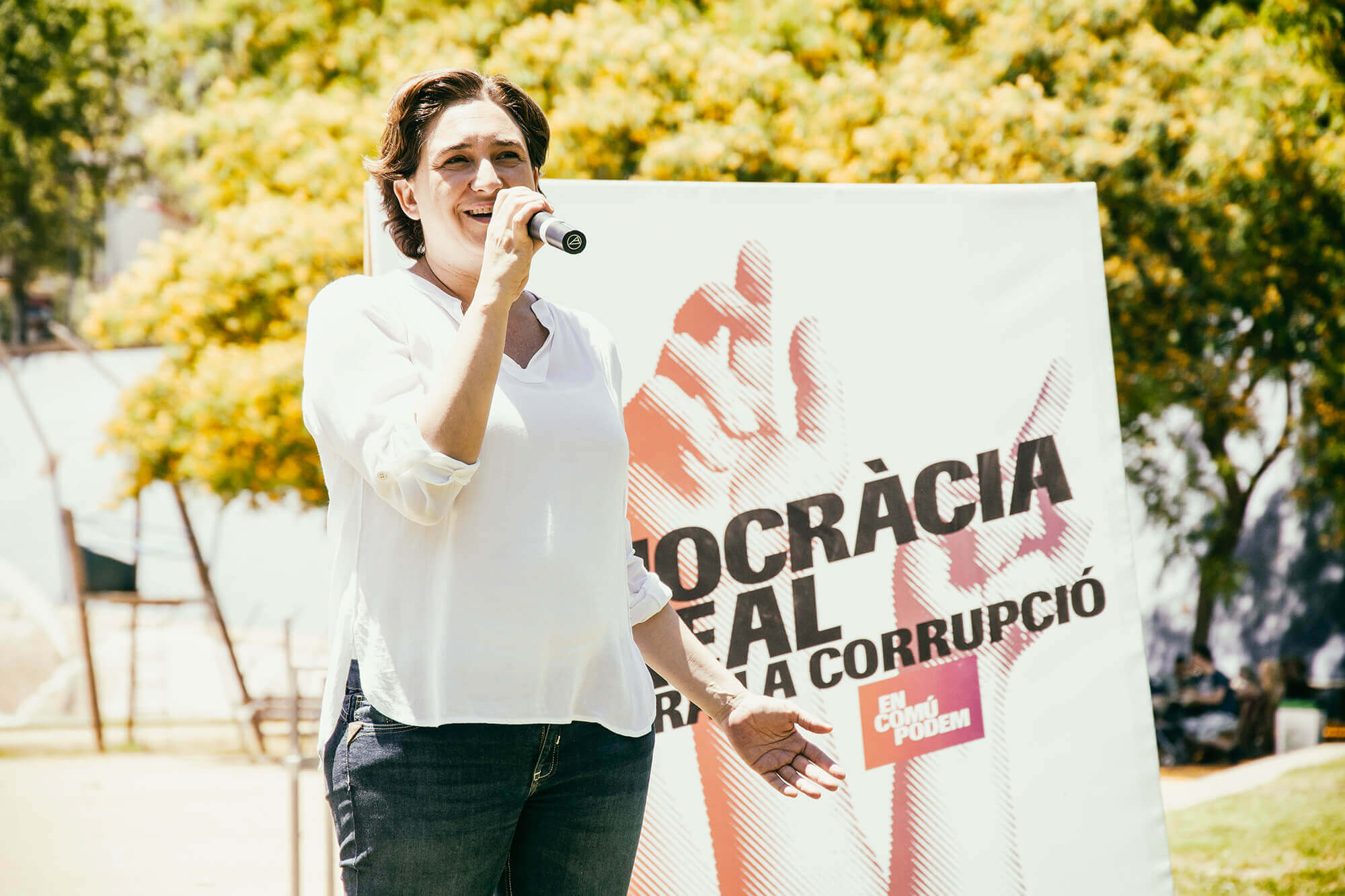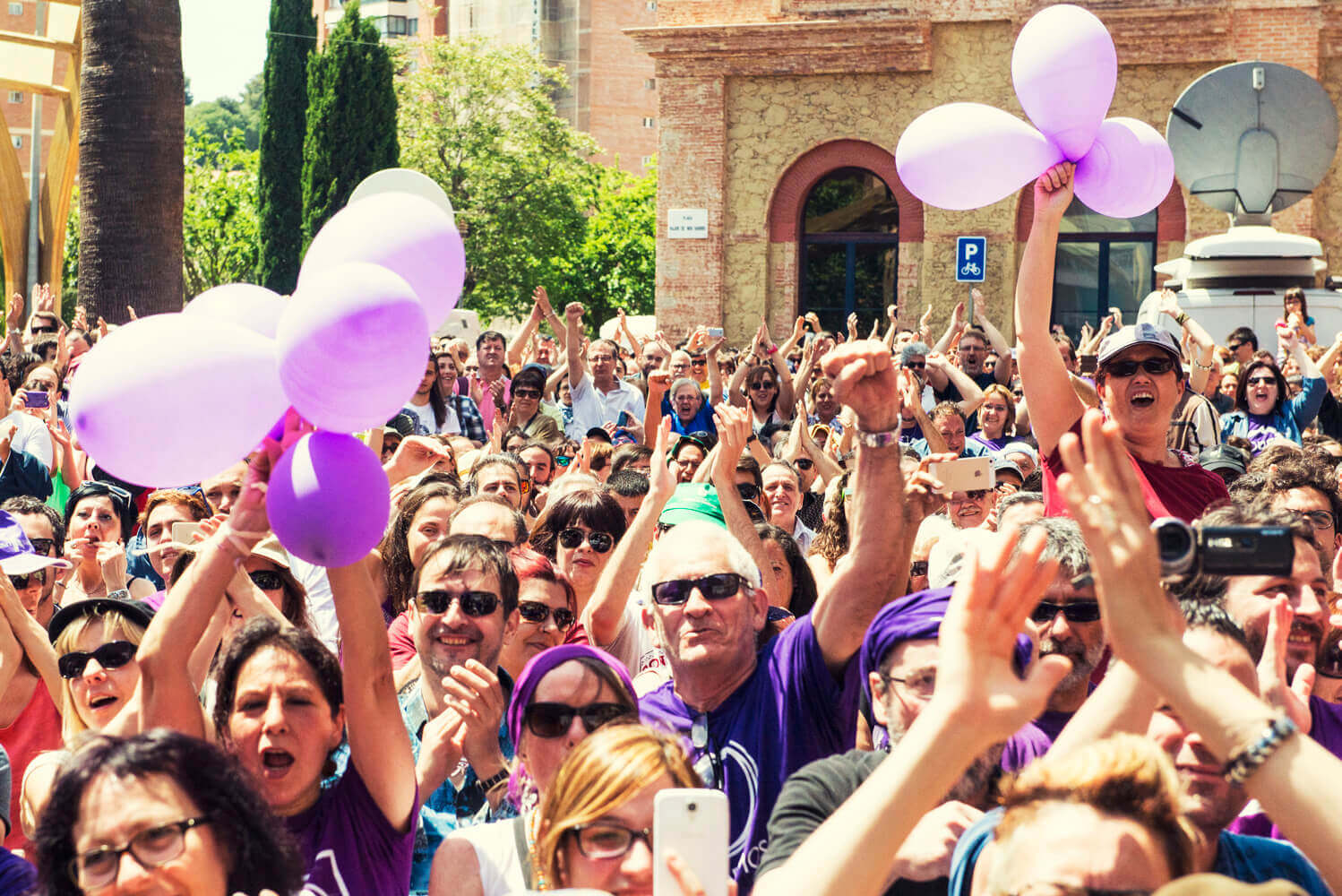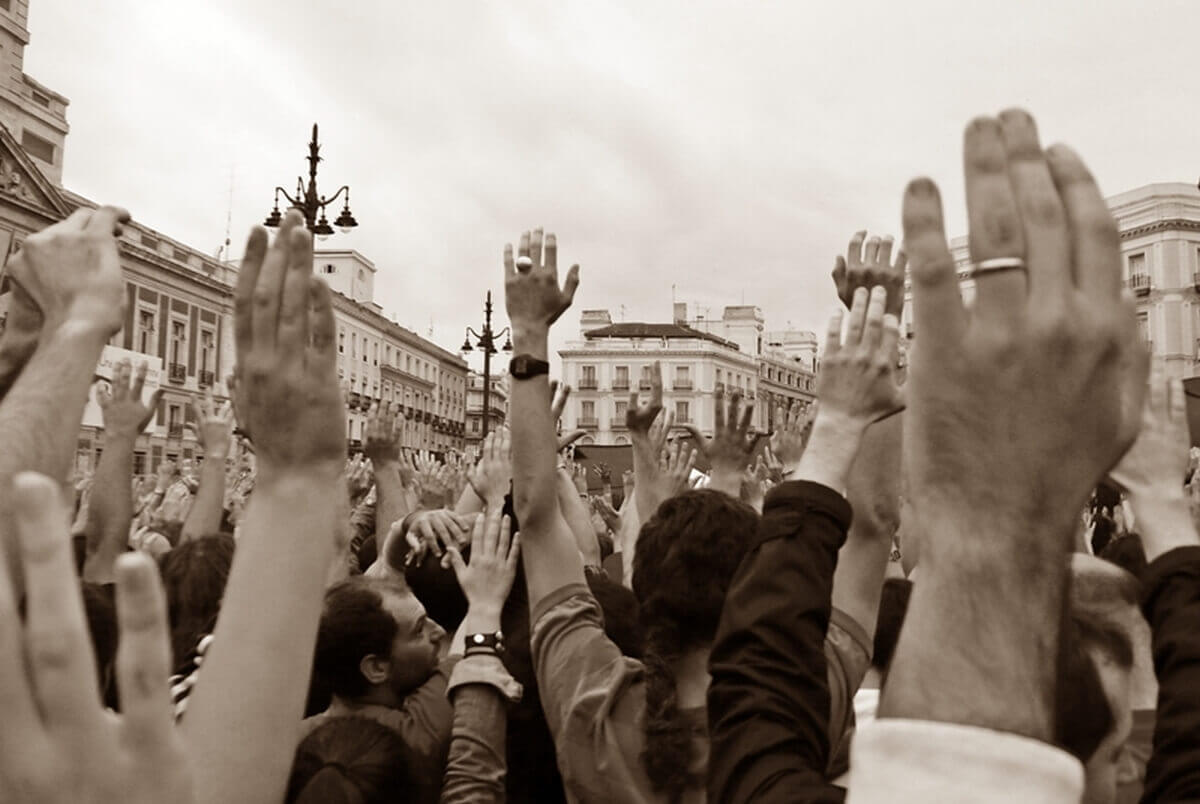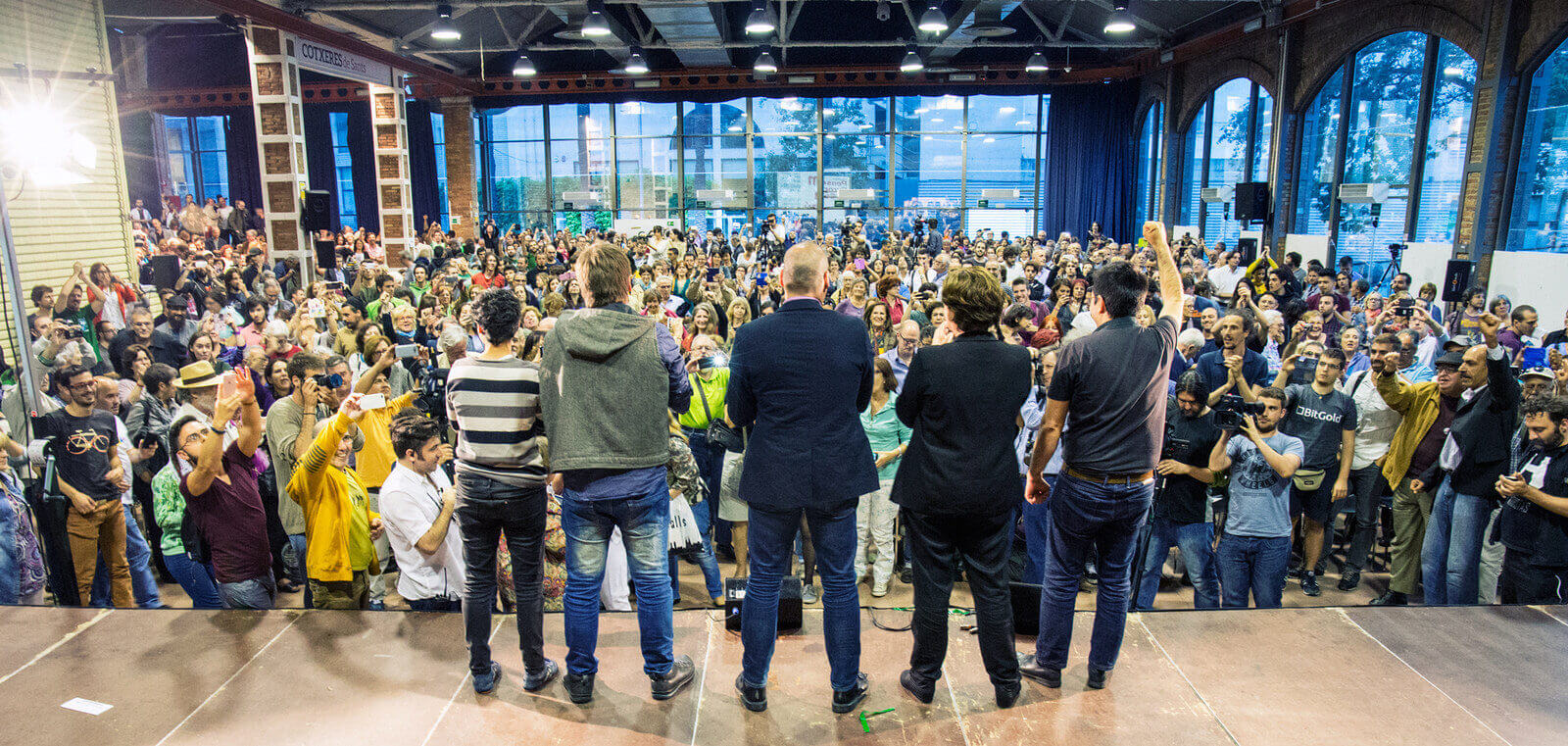This weekend the first meeting of “Fearless Cities” will take place, promoted by Barcelona en Comú. This is an international opportunity to encounter and debate the experiences of “new municipalism”, which have developed in recent years. The initiative’s headline seems absolutely appropriate when cities themselves, and the free and cooperative forms of social life that take place there, are at the centre of various, concentric attacks: by national and European policies of austerity, budget cuts and privatisations; by restrictive migration and asylum policies; by financial speculative interest in dispossessing the commons; by fossil fuel based environmental policies; by those forms of “asymmetric warfare”, that aim to create terror, and by those forms of militarization, that attempt to reduce the spaces of freedom for all. Responding, in so many different voices, “we are not afraid” is perhaps the best way to begin building real alternatives at a local, European and global level.
The discussion around the concept of “new municipalism” starts from a significant political fact: the results of the Spanish local elections in May 2015, which saw the emergence of both candidates for mayor and lists expressed by “citizens platforms”. In some major Spanish cities – including Madrid, Barcelona, Valencia, Zaragoza, La Coruña – those mayors and those coalitions are now in government. In others, they represent the main opposition force. This phenomenon is obviously related to the growth of new political forces on the national scale – Podemos, in particular, is in almost all cases a part of such coalitions – and it is linked with the cycle of mass social movements which have occupied the scene from 15M in 2011. But there are some important specific factors, too.Firstly the rise of “citizens platforms” is also connected to the structural transformations that have struck contemporary cities in the epoch of capitalist financialization, and with the
Firstly the rise of “citizens platforms” is also connected to the structural transformations that have struck contemporary cities in the epoch of capitalist financialization, and with the impact that austerity policies in urban areas has had on recent European crisis management. This is why the experience of Barcelona en Comù, leading to the election of Ada Colau, former spokeswoman of the movement for right to housing PAH, is so interesting: not only was it capable of eliciting powerful effects, both in political imagination and in reality, but it brought a new level of attention to the issue of alternative local governing in Europe.
The force expressed by this experience lies primarily in its ability to measure up to what has become a major European city like Barcelona. The contemporary metropolis is the space of social production and reproduction par excellence; the room traversed by logistic corridors and invested by the setting up of extractive platforms; the place where, more than in any other, the current forms of exploitation are exerted; the ideal testing ground for the parasitic logic of financial capitalism: its permanent aggression, through the mechanisms of indebtedness and of securities and real estate speculations, to socially produced wealth [Brenner, 2004; Sassen, 2006; Barber, 2013].
But our cities are also spaces for resistance and the invention of new forms of life: free and tendentially egalitarian, places where new social conflicts, new forms of mutual co-operation, and independent cultural initiatives proliferate. Such dynamics are, under some respects, related to the social organization of post-Fordist production, as in the flexible accumulation model implemented in the four decades of neoliberal “counter-revolution”. This endows any contemporary metropolis with a role similar to that of the factory in the previous cycle: a permanent battlefield, the place of both exploitation and struggle, domain and emancipatory organization, a scene of unending tensions between forces measuring their social relationship of power [Harvey, 2012].

Cities under attack and resistance in the European crisis regime
Such structural trends have been enhanced in the last eight years of authoritarian European crisis regime: both financialization of public debt and austerity policies, from the level of inter-governmental institutions to the single national States, have preferably targeted local authorities, heavily affecting the social life of urban communities.
From the early 2000s, local governments started having the opportunity to access the “derivatives” market, while transfers of State resources were being concurrently reduced. This resulted in the exponential growth of indebtment of municipalities, provinces and regions, a debt with rates that were closely tied to the speculative tensions within global financial market-flows. Similarly, ruthless application of the internal Stability Pact rules to local authorities can no longer be justified with a simple shortage of resources, and should be seen as a structural consequence of European policies cutting public expenditure (considered as “unproductive”) in the field of public services and, more specifically, of cuts to welfare functions. All this is part of the same attack that brought incentives and obligations to the privatization of local public services managing companies, and to the sale – or rather to the sell-off – of “assets”, which were previously considered common goods (also in a historical sense, i.e. as long-gathered fruits of the accumulation and stratification of community resources), hitherto held by municipalities and regions. The scope of the national budget manoeuvres, that have been implementing the ECB’s diktats since 2011/12, does nothing but confirm these trends [Caccia, 2012].
Consider the measures that, throughout Europe with a variable geometry, have marked the pressure on local governments over the past few years. If we outline them one after the other we can see how their real goal was to systematically deny territorial self-government, and to reduce local autonomy to a dependent variable, a subordinate and purely executive function in the design of public-spending containment. What happened was the massive transfer, at every level, of increasing amounts of socially produced wealth (and its social redistribution, both in monetary form and, indirectly, in the delivery of municipal welfare services) to private income and to the parasitic circuits of financial capital. These processes have reached a very advanced stage, which must be acknowledged.In this respect, a significant part of recent social struggles can be defined as urban movements of resistance and alternative construction “from below” faced with these same processes. Think of the struggle for access to housing, the defence of welfare services, the development of mutual co-operation to counter impoverishment, gentrification and degradation of the urban environment, or indeed, mobilizations against large speculative infrastructure projects.
In this respect, a significant part of recent social struggles can be defined as urban movements of resistance and alternative construction “from below” faced with these same processes. Think of the struggle for access to housing, the defence of welfare services, the development of mutual co-operation to counter impoverishment, gentrification and degradation of the urban environment, or indeed, mobilizations against large speculative infrastructure projects.
As in the case of other “citizens platforms”, Barcelona en Comù was able to politicize and enhance this heritage of struggles and experiences, combining the contributions and organizing the confluence of social movements and civic initiatives with that of “old and new” political forces, such as Podemos and Procés Constituent, the ecologists of ICV and Equo, the communists of Esquerra Unida i Alternativa (EUiA), and part of the Catalan left-independence advocates. In this sense, a social coalition became a political coalition [Candeias, 2015 and Russo Spena-Forti, 2016]. With great generosity, with the mutual willingness to listen and in a permanent search for unity. With the explicit aim of winning a social majority and transforming it into an electoral majority, in order to take the government of the city and turn it into an effective lever of change. With a candidate such as Alcaldessa, who managed to synthesize all these points.
A long history, of “free cities” and heretical political cultures
On the other hand, we can look to the current concept of “new municipalism” from the perspective of various long term genealogies that are by no means far-fetched. Think of the pages that Hannah Arendt [1958] dedicated to the ancient Greek poleis, sometimes idealized as a paradigmatic model. Or think of the medieval towns, in Italy and beyond, that were recognized as a place of liberation from servile constraints, as is testified by a way of saying which is identical in all languages of the time: “the air of city makes you free”. And think of those cities’ double conflict, with the Empire and with feudal powers, of the story of the small “republics at the time of monarchies”, as a completely different model of sovereignty. And think of the autonomous trading power developed in the network of Hanseatic cities.
Closer to us in time, it is necessary to look at those forms of resistance to political centralization processes, as characteristic in the construction of the modern national State. Some of them were remnants of the Ancient Régime, but most were intertwined with the nascent labor movement, and its socialist and anarchist cultures. This was one of the themes of open controversy between Proudhon and Marx, although the latter later recognized that, in the experience of the 1871 Paris Commune, the multiplication of municipalities (“Communes”) in other towns and cities of France, and to their free federation, could have been a strategic move for the revolutionary process.
But if, from the perspective of Barcelona en Comù, we stay within the borders of Spanish State, there is a strong and repressed tradition, which is linked to the thought of Francesc Pi i Margall [1863], a Catalan philosopher and politician, and second president of the First Republic. Mergall theorized, with visionary anticipation, a federalism founded not only on the decentralization of administrative powers, but on “municipal pacts”, mutual and bilateral agreements, that included a social organization extending beyond the local authority and the private property system [Observatorio Metropolitano, 2014].

The 1990s saw a resurgence of “municipalist” discourse on various sides. Just think of the “communalist” proposal by Murray Bookchin. “The immediate agenda of libertarian municipalism is to re-open the public sphere in opposition to any statalism, to allow the maximum of democracy in the literal sense, to create institutions which, in embryonic form, can give power to the people,” he writes in 1987. His starting point is that there can be no politics without community. And his concept of community foreshadows a free association of citizens on the municipal base, reinforced in their own autonomous economic capacity by grassroot organizations and by the support of other confederations, organized into regional networks. The Zapatista insurrection of January 1994 was later credited for boosting the idea of “self-governance of communities,” providing arguments that – in the cycle of “global justice” movement – have supported both the local participatory processes peculiar to Latin America, and “counter-imperial” networks such as the Local authorities Forum.
The Municipality, the Commune, the Common-wealth: reinventing democracy
There is a first lesson we should learn from this stratification of historical experiences and heretical political cultures: it is impossible to foreshadow a “new municipalist” horizon without a comprehensive federalist approach that is characterized in turn by strong material, social and egalitarian content. We might hazard to say: a class point of view is needed. With a bit of a pun we might draw a line linking the Commune (in the double meaning of original local institution and historical instance of revolutionary rupture) and the concept of “common.” In the rich and recently revived debate on the commons, the contribution of authors such as Hardt and Negri [2009] among others brought a definition which overrules any misunderstanding in terms of naturalistic and organicist approach: common is the collective and multitudinous production of material and immaterial reality, that precedes its appropriation by private or public (i.e. State). Here the very notion of democracy has to be challenged, theoretically and practically. Indulging in a rather brutal synthesis, democracy today can only be considered as collective political decision, taken by the many, on what is common. In this sense, “new municipalism” necessarily implies an attempt to radically re-invent democracy’s meaning and practice.
In the language of Barcelona en Comù this attempt would be called “citizens protagonism”. But that of “citizenship” is a slippery slope and should be undertaken with great caution. In our towns, citizenship is often used as a vector of differential exclusion from precisely the sphere of rights that are associated with it. Ada Colau sent an explicit message when she had Barcelona take clear sides on the issue of refugees, proposing a network of “shelter cities” engaged in the field of welcome and social inclusion policies, openly defying the closed-door choices taken by national governments and European institutions. Here is an extensive and inclusive idea of citizenship, because to decide that all residents in our cities, disregarding their origin and their status, can enjoy equal rights and duties is currently disruptive.

We must be equally clear about what “protagonism” may mean. At this point it is necessary to abandon certain “participatory” illusions, which accompanied the worldwide municipalist wave of the early 2000s [Caccia, 2002]: it is not a matter of formal consultation procedures and protocols; the question is rather what, how and especially who is to decide. The focus on political decision is the real legacy of the public squares of 2011, of the cycle of struggles starting from 15M, of the acampadas, and then of the mareas [Candeias-Völpel, 2014]. It is the distinctive features of the variety of fights against inequalities that can fill the floating signifier “those below versus those above” with material and social meaning. Oligarchies, some of which are solidly implanted in the political system (and in the media), but above all are economic and financial, have taken over – and try to do it every day in our cities – collective resources, and a production of wealth, that is instead common. In this sense, the new municipal hypotheses tries to develop the rhetoric of “99 percent against the 1 percent” into a constituent practice, with proposals aimed at a real transformation of the metropolis (and its institutions), so as to ensure – as recited in the Principios of Barcelona en Comù – “fundamental rights and a life worthy to all people” through an “economy based on social and environmental justice.”
Iberian citizen platforms, and their current experiences in government, inspire a Europe-wide re-thinking, that can no longer be postponed in social and political emancipatory practices of the left at a local level. To talk of a “model”, nonetheless, would be incorrect. Barcelona is a one and extraordinary exemplum, in that it is subverting the order of assigned roles. It is an exemplum such as those exempla that enrich the pages of Spinoza’s Ethica. If we are ready to grasp the deep spirit of the new municipalist discourse, we shall easily see how the powerful imagined import of those experiences potentially turns any local context in a real “laboratory” growing out of its own specific social, political and institutional dynamics.
In this respect, one of the most common mistakes is that of building analytical castles where apparently everything adds up. Or to theorize, on the basis of such constructs, an abstract “centrality” of this or that political ground. We should not load the shoulders of the new municipal experiences with the full weight of the drastic turnaround, which would be needed to save Europe from itself and from the disintegration process in place. Such experiences are certainly a vital antidote against the dangerous return of nationalisms. They represent a decisive space for testing innovative practices of direct citizen protagonism in political decision making, and they can definitely serve in the reconstruction of a social fabric, which is frayed and jagged after four decades of neoliberal policies. But if in Europe today we want to put democracy and social equality on the agenda, we must dare a real multi-level logic, and assume the insights of most advanced “societal constitutionalism” [as, for example, in Joerges-Sand-Teubner, 2004]. The accumulation of force which is needed to reverse the dramatic asymmetry of current power relations can only come from the articulation of a multiplicity of initiatives, from linking and synchronizing them. That’s why “new municipalism” is not about working on a smaller scale, one that is more accessible “from below” compared to the national or transnational level, even if it does feed into the rhetoric of “small is beautiful”, proposing on a more minute level the localistic ideology of “Kleinen Vaterländer.”

Internal and external limits of New Municipalism: how to overcome them
“Winning elections is not the same as winning back the city” [Shea Baird, 2015]. Government and power are two distinct objects, and a renovated concept of the former may avoid the traps of aporetic representative logic in the new municipalist prospect. The crisis in political representation is serious, structural, and irreversible. There is no need to retrace here the historical reasons of why the link between delegation and the exercise of political obligation was definitively broken. What matters is the divorce between capitalism and democracy, which is most evident. Citizen platforms such as Barcelona en Comù were able to win local elections in Spain by bringing forth a powerful message, and that was the plea for a consensus that would not “be representative of the struggles” (i.e. a right of tribune “on behalf” of social movements), but would rather govern the city, producing real change.
This is only possible if a permanent dialectic is kept open between conflictual and propositive social dynamics on one hand, and creatively receptive institutional structures on the other. In a way that combines the push from below of “new institutions”, with a profound transformation capable of being invested in the same “constituted institutions”. Such a process is destined to clash with the internal and external limitations of even the most subjectively radical and innovative local experience. And this is where the issue of power arises: in the midst of the thick web of real economic and social, media and political power relations innervating the life of metropolis. Nor must we forget the legal and institutional, the financial and economic constraints that influence every choice in city government: from the national to the global, passing through the bonds imposed by the executive role of the Member states in the framework of European governance.
This process sets up a challenge: we need to force those limits and to develop, beyond and against every localist temptation, a new attitude to networking among “rebel cities” (as Gerardo Pisarello, echoing Harvey, once called them), and to build a political space of expression for the “Fearless Cities,” cities that are capable of maintaining and increasing productive relationships both with struggles and social movements, and with change-oriented political parties at the national level and, even more, on the currently indispensable scale of European and Euro-Mediterranean transnational action.In cities the devolution of top-down sovereignty, from institutions to citizens, is a necessary prerequisite to
In cities the devolution of top-down sovereignty, from institutions to citizens, is a necessary prerequisite to regain spaces of democratic sovereignty upwards, towards higher powers. And this is the only way to avoid a rapid shift from enthusiasm to disillusionment, from euphoria to depression.
This article was first published in German for the LuXembourg Zeitschrift and then in Italian in EuroNomade website as an anticipation of a wider forthcoming study. We thank Rosa-Luxemburg-Stiftung for having allowed publication in PoliticalCritique.org .
Literature
- Hannah Arendt, The Human Condition, University of Chicago Press, Chicago IL 1958;Benjamin R. Barber, If Mayors Ruled the World: Dysfunctional Nations, Rising Cities, Yale University Press, New Haven CT 2013;
- Neil Brenner, New State Spaces. Urban Governance and the Rescaling of Statehood, Oxford University Press, Oxford 2004;
- Murray Bookchin, From Urbanization to Cities: Toward a new politics of Citizenship, Cassell, London 1987;
- Giuseppe Caccia, Democrazia partecipativa e autogoverno locale in Aa.Vv., La democrazia possibile, Intra Moenia, Napoli 2002;
- Giuseppe Caccia, Municipalismo e rappresentanza in AA.VV., Guerra e democrazia a cura di M. Tarì, Manifestolibri – Uninomade, Roma 2005;
- Giuseppe Caccia, “Financialization and debt as private grabbing of “common wealth”: The crisis of local government and the search for alternatives in Europe”, http://debt-issues.blog.rosalux.de/files/2012/12/paper_RLS_workshop_on_debt_nov_2012.pdf, Berlin, November 2012;
- Mario Candeias – Eva Völpel, Plätze sichern! Re-Organisierung der Linken in der Krise. Zur Lernfähigkeit des Mosaiks in den USA, Spanien und Griechenland, VSA Edition, Hamburg 2014;
- Mario Candeias, “Demokratische Rebellion. Einige Lehren nach der Kommunal- und Regionalwahl im spanischen Staat”, https://www.rosalux.de/news/41522/demokratische-rebellion.html, Rosa-Luxemburg-Stiftung, Berlin May 2015;
- Pierre Dardot – Christian Laval, Commun. Essai sur la révolution au XXI siècle, La Découverte, Paris 2014;
- Christian Joerges – Inge-Johanne Sand – Gunther Teubner (Eds.), Constitutionalism and Transnational Governance, Oxford University Press, Oxford 2004;
- Michael Hardt – Antonio Negri, Commonwealth, Harvard University Press, Harvard MA 2009;
- David Harvey, Rebel Cities. From the Right to the City to the Urban Revolution, Verso books, London – New York 2012;
- Karl Marx, The Civil War in France, London 1871 (First original edition);
- Observatorio Metropolitano, La apuesta municipalista. La democracia empieza por lo cercano, Traficantes de Suenos, Madrid 2014;
- Francisco Pi i Margall, Las nacionalidades. Escritos y discursos sobre federalismo (Ramón Máiz Ed.), Editorial Akal, Madrid 2009;
- Pierre-Joseph Proudhon, Du principe fédératif et de la nécessité de reconstituer le parte de la révolution, Bruxelles 1863 (First original edition);
- Giacomo Russo Spena – Steven Forti, “Diritti e autogoverno, la lezione di Ada Colau”, http://temi.repubblica.it/micromega-online/diritti-ed-autogoverno-la-lezione-di-ada-colau/, in Micromega on line, March 2016 (Anticipation of book forthcoming by Edizioni Alegre, Roma);
- Saskia Sassen, Territory, Authority, Rights. From Medieval to Global Assemblages, Princeton University Press, (updated ed.) Princeton NY 2006;
- Kate Shea Baird, “Rebel cities: the citizens platform in power”, http://www.redpepper.org.uk/rebel-cities-the-citizen-platforms-in-power/, in Red Pepper, December 2015.
![Political Critique [DISCONTINUED]](http://politicalcritique.org/wp-content/uploads/2015/09/Political-Critique-LOGO.png)
![Political Critique [DISCONTINUED]](http://politicalcritique.org/wp-content/uploads/2015/09/Political-Critique-LOGO-2.png)